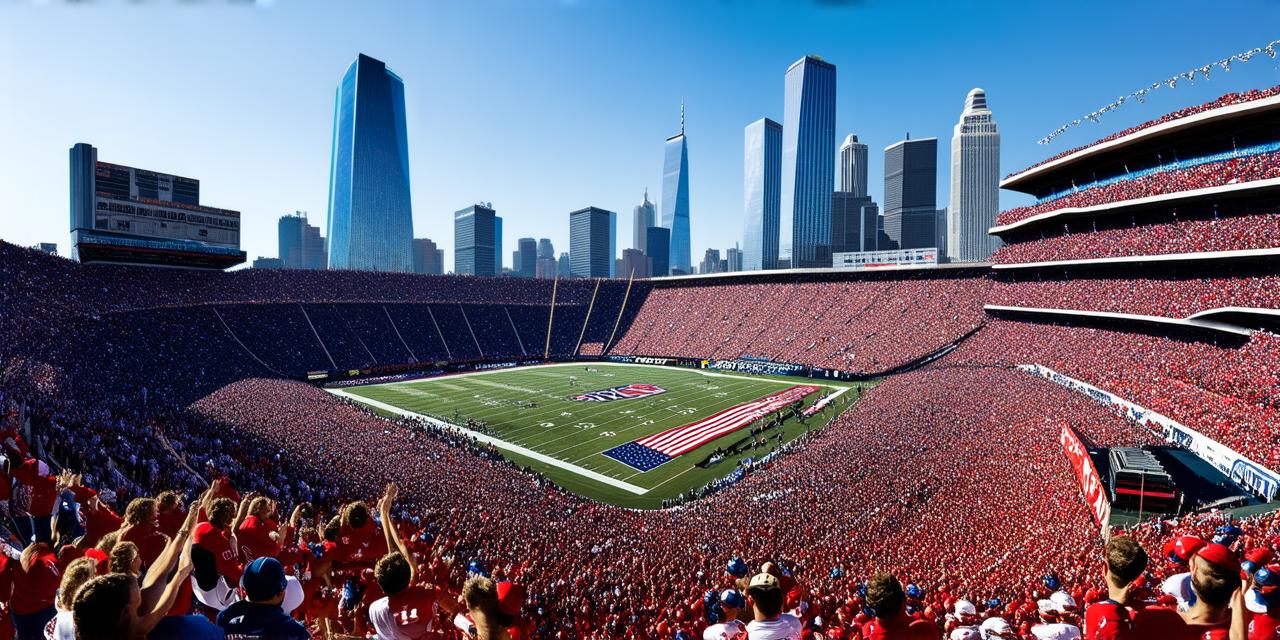The NFL uses a variety of criteria to choose the city that will host the Super Bowl each year. These include:
Climate
Weather conditions can play a big role in determining where the Super Bowl will be held. Cities with mild temperatures and low precipitation during the game’s scheduled dates are often preferred over colder or wetter locations. For example, Miami, Florida has hosted the Super Bowl four times due to its warm and sunny weather.
Availability of Stadiums
The NFL prefers to hold the Super Bowl at stadiums that have already been built, rather than building a new one from scratch. However, if there is a city with an existing stadium that cannot accommodate the game due to capacity constraints, the league may consider building a new stadium specifically for the event. For instance, in 2019, the Super Bowl was held at the Hard Rock Stadium in Miami, Florida because it was the only stadium in the country with enough seating to host the game and had undergone renovations that made it suitable for hosting the NFL’s biggest event.

Travel Distance and Accessibility
The NFL wants to make sure that fans can easily get to the host city, so they look for locations that are easy to reach by car or airplane. In addition, cities with good public transportation options are often preferred over those that require a lot of driving or flying to get around. For example, Atlanta, Georgia has hosted the Super Bowl twice because it is easily accessible by both car and airplane and has a good public transportation system.
Economic Impact
Finally, the NFL wants to make sure that the host city will be able to support the economic demands of hosting the Super Bowl. This includes things like hotel rooms, restaurants, and other local businesses. Cities with strong economies and a track record of successful events are often given preference over those that may struggle to handle the influx of visitors. For instance, New Orleans, Louisiana has hosted the Super Bowl six times due in part to its strong economy and tourism industry.
What does this mean for web developers?
As a web developer, you may not have a direct impact on which city hosts the Super Bowl each year. However, there are still ways you can prepare for the event and ensure that your clients’ websites are ready for the influx of traffic that will come with it. Here are some tips:
Optimize for Mobile
The Super Bowl is traditionally one of the most-watched television events of the year, but more and more people are watching on their mobile devices. Make sure your clients’ websites are optimized for mobile viewing, so that fans can easily access information about the game and the host city from their smartphones or tablets. You may also want to consider using responsive design techniques to ensure that your website looks good on any screen size.
Plan for Increased Traffic
With millions of people tuning in to watch the Super Bowl each year, there is a lot of traffic that will be heading to the host city’s websites. Make sure your clients have plans in place to handle the increased demand for their sites, including things like load balancing and caching to ensure fast response times for users. You may also want to consider using content delivery networks (CDNs) to distribute your website’s content across multiple servers, reducing the load on any one server and improving overall performance.
Create Engaging Content
The Super Bowl is a big event, and people are always looking for ways to connect with it online. Encourage your clients to create engaging content related to the game, such as blog posts about local restaurants or special offers for fans in town. This can help drive traffic to their sites and keep visitors engaged throughout the event. You may also want to consider using social media platforms like Instagram and Twitter to promote your client’s content and engage with fans directly.
Be Prepared for Social Media
Social media is a big part of any major event, and the Super Bowl is no exception. Encourage your clients to be prepared for an influx of social media activity related to the game, and make sure they have plans in place to monitor and respond to comments and messages from fans online.
